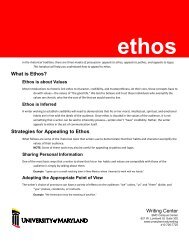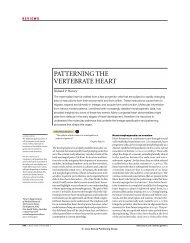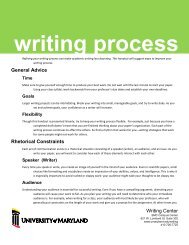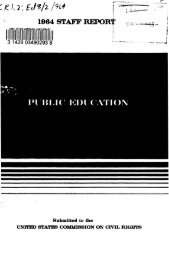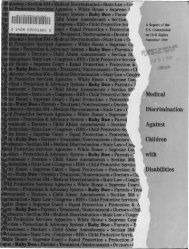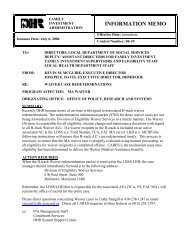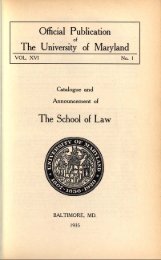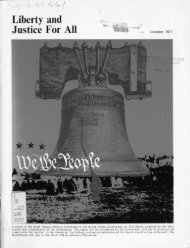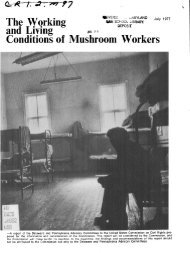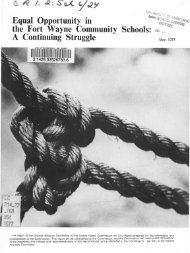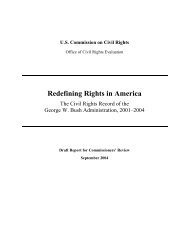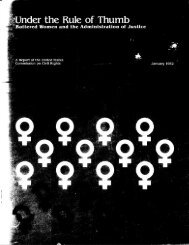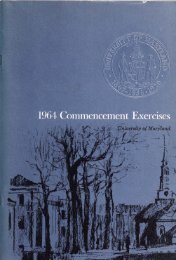1961 US Commission on Civil Rights Report Book 2 - University of ...
1961 US Commission on Civil Rights Report Book 2 - University of ...
1961 US Commission on Civil Rights Report Book 2 - University of ...
Create successful ePaper yourself
Turn your PDF publications into a flip-book with our unique Google optimized e-Paper software.
6. The Threat to Educati<strong>on</strong><br />
... no instrumentality less universal in its power and authority<br />
than Government can secure popular educati<strong>on</strong>. . . . without<br />
popular educati<strong>on</strong>, moreover, no government which rests <strong>on</strong> popular<br />
acti<strong>on</strong> can l<strong>on</strong>g endure. . . .<br />
WOODROW WILSON<br />
As a premise to its c<strong>on</strong>clusi<strong>on</strong> in the School Segregati<strong>on</strong> Cases that separate<br />
educati<strong>on</strong>al facilities are inherently unequal, the Supreme Court<br />
stressed the importance <strong>of</strong> educati<strong>on</strong> as "perhaps the most important<br />
functi<strong>on</strong> <strong>of</strong> State and local governments," x and observed that the opportunity<br />
for educati<strong>on</strong> ". . . where the State has undertaken to provide<br />
it, is a right which must be made available to all <strong>on</strong> equal terms." 2<br />
In 1955 a three-judge Federal district court in discussing the Supreme<br />
Court decisi<strong>on</strong> in Briggs v. Elliott, <strong>on</strong>e <strong>of</strong> the original School<br />
Segregati<strong>on</strong> Cases, 3 elaborated <strong>on</strong> "what the Supreme Court has decided<br />
and what it has not decided in this case": *<br />
[It] has not decided that the States must mix pers<strong>on</strong>s <strong>of</strong> different<br />
races in the schools or must require them to attend schools or must<br />
deprive them <strong>of</strong> the right <strong>of</strong> choosing the schools they attend. What<br />
it has decided, and all that it has decided, is that a State may not<br />
deny to any pers<strong>on</strong> <strong>on</strong> account <strong>of</strong> race the right to attend any<br />
school that it maintains. . . . Nothing in the C<strong>on</strong>stituti<strong>on</strong> or in<br />
the decisi<strong>on</strong> <strong>of</strong> the Supreme Court takes away from the people<br />
freedom to choose the schools they attend. . . . The i4th amendment<br />
is a limitati<strong>on</strong> up<strong>on</strong> the exercise <strong>of</strong> power by the State or<br />
State agencies, not a limitati<strong>on</strong> up<strong>on</strong> the freedom <strong>of</strong> individuals.<br />
This exegesis underlies a number <strong>of</strong> measures taken by States <strong>of</strong> the<br />
Deep South in resp<strong>on</strong>se to the School Segregati<strong>on</strong> cases. The i4th<br />
amendment prohibits racial segregati<strong>on</strong> <strong>on</strong>ly by the States and their<br />
instrumentalities. Eliminate participati<strong>on</strong> by the States in the field <strong>of</strong><br />
educati<strong>on</strong>, and segregati<strong>on</strong> can be preserved. Measures premised <strong>on</strong><br />
this reas<strong>on</strong>ing were enacted by all <strong>of</strong> the former C<strong>on</strong>federate States<br />
save Tennessee, 5 ranging from laws compelling or allowing the closing<br />
<strong>of</strong> public schools, through the repeal <strong>of</strong> compulsory school attendance<br />
79



